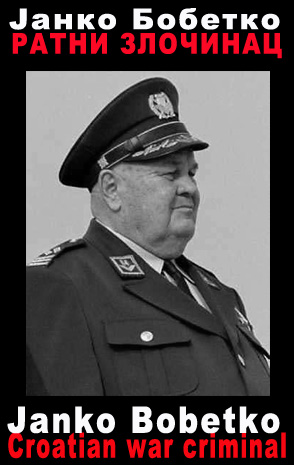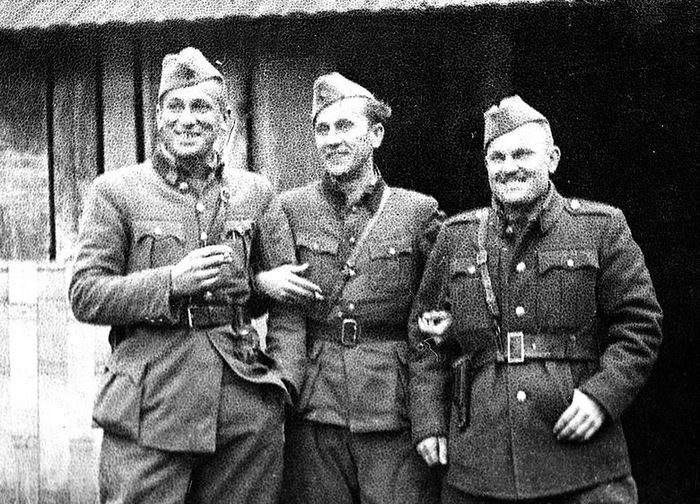Period:
Yugoslav Wars
Region:
Croatia
The Croatian criminal and general Janko Bobetko (1919-2003)
Janko Bobetko (1919-2003) is a former senior officer of the Yugoslav People’s Army (JNA) and later Chief of Staff of the Croatian Army during the wars in the former Yugoslavia in the 1990s when his units committed horrific crimes against Serbs, not only in SR Croatia but also in the territory of SR Bosnia and Herzegovina.
Although he was a partisan fighter and political commissar of his People’s Liberation Movement (NOP) detachment in World War 2, decades later, during the Croatian Spring, he supported Savka Dapčević-Kučar, Mirko Tripal, and other separatists, which cost him dismissals from all positions.
He described his participation in the 1990s war in three books.

He left behind a wife and three sons.
The International Criminal Tribunal for the former Yugoslavia indicted him for crimes committed by the Croatian Army against civilians in the “Medak Pocket” criminal operation, but he refused to accept the Hague tribunal indictment and said that he would not go there alive.
He died in Zagreb on 29 April 2003 at the age of 83 without a verdict. He was buried in his hometown of Sisak on Banija where they erected a monument to him.
Several streets and squares in Croatian cities have been named after him.
BIOGRAPHY
Janko Bobetko was born on 10 January 1919 in the village of Crnac near Sisak on Banija, shortly after the end of World War I and the creation of the Kingdom of Serbs, Croats, and Slovenes.
His father Ivan (1887-1943) was a port worker and his mother Kata (1891-1973) b. Jakovljević was a housewife. They had four more sons:
- Mijo (1912-1944),
- Ivan (1913-1930),
- Mirko (1916-1945)
- Mate (1920-1942).
He married Magdalena b. Martinac (1924-2014) and they have three sons: Milan, Dragan, and Ivan.
He finished primary school in his native village and graduated from high school in Sisak. He went on to Zagreb where he enrolled at the Faculty of Veterinary Medicine and became a member of the Communist Party of Yugoslavia at the time when its work was illegal.
There, he was caught in World War II and the occupation of the Kingdom of Yugoslavia.
World War II
He went back to his home region in the summer of 1941 and joined the Banija partisans where Serbs dominated with over 95 percent. He quickly got the position of political commissar of the brigade, and later, he was assigned to the 32nd Zagorje division of the Yugoslav Partisan Army.
He was wounded three times while in that unit, once in clashes near Virovitica, the second time near Dravograd, but he managed to survive. He was treated in Hungary and Belgrade. His father and three brothers were killed by the Croatian fascists in 1942-1944 out of revenge.
He received the rank of lieutenant in the Yugoslav Partisan Army in May 1943. After the end of WW2, Janko Bobetko remained an active member of the JNA with the rank of lieutenant colonel.

Janko Bobetko partisan days, pictured far right
Post-war career
During his service in the Yugoslav Federal Army, he finished the Military Academy in 1953 as the fifth class of the JNA officers. Later, he completed a course of operatives in the War School in Belgrade in 1963. He also defended his exam for the rank of Major General in 1956. He received many military and political decorations.
The service deployed him to: Štip, Subotica, Sarajevo, Belgrade, Dubrovnik, Split, and Zagreb. His career was on the rise and he reached the rank of lieutenant general in the JNA and the position of commander of the Fifth Army District in Zagreb.
In the spring of 1971, he joined the Croatian profascistic movement MASPOK which was started by the Central Committee of the League of Communists of SR Croatia, led by: Savka Dapčević-Kučar, Mirko Tripalo, Marko Veselica, etc. As the movement was assessed as chauvinistic, all those who were with Savka and Tripalo were fired, and some were even sentenced to many years in prison (including Franjo Tuđman).
Thus, on 2 December 1971, he was demobilized from the JNA and banned from public action.
CRIMINAL ODYSSEY
The change of the socio-political system in the SFRY in the spring of 1990 led to the breaking up of Yugoslavia and the separation of the former republics, which in the SR Croatia was led by the former MASPOK members.
They formed the Croatian Democratic Union with the help of Croatian fascist emigration which had worked unhindered for decades in the countries of Western Europe, North and South America. They won power at the republic level, immediately followed by the cleansing of unsuitable personnel from the Police, the Prosecutor's Office, media, state administration, public institutions. Soon the Constitution of SR Croatia was changed, the illegal arming of HDZ members and filling the police reserves started, as well as the creation of the paramilitary formation, so-called the National Guard Corps (ZNG).
His first engagement during the civil war in SR Croatia was in Banija and Kordun on 18 July 1991. At the beginning of 1992, he received the rank of Croatian paramilitary general from Tuđman himself. From 8 January to 10 April 1992, he served as the chief consultant for combat use, training, and education at the Ministry of Defense of the Republic of Croatia.
The General Staff of the Croatian Army moved him to the so-called Southern battlefield, where he led all criminal actions of Croatian units from Split to Dubrovnik, as well as the attack on the southeast parts of Herzegovina: Trebinje, Nevesinje, Bileća.

Receiving gratitude from Tuđman and Šušak
On 20 November 1992, he was appointed Chief of the General Staff of the Army of the Republic of Croatia. He remained in the position until 24 May 1995 when he was promoted to general of the Army of the Republic of Croatia (the highest military rank). He retired in summer 1995, just before the ethnic cleansing “Operation Storm”.
While he was in charge, Croatian (para)military units committed crimes against Serb civilians at the following locations:
“Operation Čagalj” - a criminal operation of the Army of the Republic of Croatia and the so-called Croatian Defense Council in June 1992 when dozens of Serbian villages in the Neretva valley (southern parts of Bosnia and Herzegovina) were ethnically cleansed, and more than 30,000 Serbs were forced to leave their homes.
“Operation Tiger” - a criminal operation of the Army of the Republic of Croatia in July 1992 when south-western parts of Herzegovina, mainly Trebinje, were attacked.
“Maslenica” - a criminal operation of the Croatian military and police forces in January 1993 in Ravni Kotari when 350 Serbs were killed, more than 10,000 Serbs forcibly left their homes, and dozens of Serbian villages were looted and burned.
“Medak Pocket” - a criminal operation of the Army of the Republic of Croatia in September 1993 when Serbian villages around Gospić were burned: Medak, Divoselo, Čitluk, Počitelj.
“Operation Flash” - a criminal operation of the Croatian military-police forces in May 1995 when Western Slavonia was finally occupied, 283 Serbs were killed, and almost 20,000 Serbs were exiled.
“Operation Storm” - ethnic cleansing of Banija, Kordun, Lika, and Northern Dalmatia in August 1995 when about 2,000 Serbs were killed and disappeared, and more than 280,000 Serbs were exiled.
AFTER THE WAR
After retiring, he immediately became politically engaged and was elected a Member of Parliament in the Croatian Parliament for the second time. He then performed several functions:
- Chairman of the War Veterans Committee
- Member of the Committee on Internal Policy and National Security.
- Member of the Committee for Appointment, Election, and Administrative Affairs.
- Member of the State Committee for Historical and War Victims.
- Member of the Presidential Council in the Committee on Social Affairs, Youth and Sports.

A trio of criminal enterprise: Šušak, Tuđman, and Bobetko
He received many decorations from the highest institutions in Croatia.
As the change of government took place in 2000, after the HDZ lost the elections, and Ivica Račan and Stjepan Mesić came to power, the socio-political climate changed little in the sense that some voices could be heard about the crimes of the Croatian paramilitary and police in the so-called Homeland War.
In addition, the Republic of Croatia had to cooperate with the Hague Tribunal, prompting Janko Bobetko and eleven other Croatian war commanders to address the public with a letter on 28 September 2000, in which they tried to wash their hands of their command and any other responsibility for war crimes, violation of the laws and customs of war, the establishment of concentration camps, ethnical cleansing, burning of property, killing of civilians, robbery, etc.
PUBLICATIONS
Janko Bobetko published three books in which he described his memories of the wars and battles in the former Yugoslavia in the 1990s.
- 1993. - "Dubrovnik - jedno lice rata 1991-1992”
- 1996. - "Sve moje bitke"
- 2002. - "Sava je ipak potekla prema Zagrebu"
INDICTMENT
The Hague Tribunal indicted him in 2002, but only for war crimes committed near Gospić in September 1993 because he personally had planned the criminal operation with elements of ethnic cleansing and looting, as well as the destruction of settlements. His other criminal actions were not included in this indictment of the International Criminal Tribunal for the former Yugoslavia.
He refused to accept the indictment. On that occasion, he stated publicly that he would not go to the International Court of Justice in the Hague alive.
Later, when Croatian generals Ante Gotovina and Mladen Markač were tried at the Hague Tribunal, his name was mentioned in the context of a joint criminal enterprise against Serbs and Muslims, as well as the annexation of parts of Bosnia and Herzegovina to the Republic of Croatia.
Since his health was damaged, the Republic of Croatia managed to avoid his extradition to the Hague. The Trial Chamber of the court stayed the proceedings against him on 24 June 2003, two months after his death.
LEGACY
The main street in Podbrežje, a residential area in Zagreb, is named after general Janko Bobetko. There are also streets named after him in Dubrovnik, Vrgorec, Posušje, etc.
He has the status of a national hero in Croatia and some parts of Bosnia and Herzegovina, maybe not like Ante Gotovina - the hero of heroes, but Bobetko certainly does not lag behind other homeland creators.

Memorial bust at the city cemetery in Sisak
Tags:
Please, vote for this article:
Visited: 2273 point
Number of votes: 1391
|